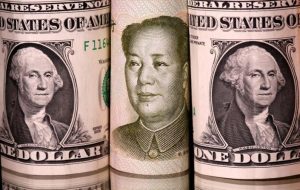Markets across Asia were a sea of red on Thursday as fading hopes of a rate cut this year and a global spike in bond yields put a dampener on investor sentiment.
The Nikkei share average fell 1.3% to close at a one-month intraday low, tracking headwinds from a slump on Wall Street and soaring Japanese government bond (JGB) yields.
The Japanese benchmark index pared some losses after declining as much as 2.4% earlier in the session, to break below the crucial 38,000-level.
Also on AF: After Much Planning, China’s EV Makers Set to Storm Europe
The 10-year JGB yield hit its highest level since July 2011 at 1.1% in the Asian morning as investors bet on another rate hike in Japan as soon as July and remained wary of tapering of the central bank’s bond purchases.
While low compared with their US peers, JGB yields, which were higher than a decade peak, still had a significant impact on market sentiment, Hiroshi Namioka, chief strategist at T&D Asset Management, said.
“It’s a bit of a psychological shock for market players who haven’t seen yields rise like this until now, or rather, who have become numb as easy monetary policy continued for such a long time.”
Technical reasons such as end-of-the-month portfolio rebalancing also contributed to the Nikkei’s steep decline, he said.
Major technology shares, which tend to hurt under rising yields since higher rates make borrowing more expensive, were among some of the biggest drags on the index. Chipmaker Advantest fell 6.1% to become the worst percentage performer on the index, while Tokyo Electron dropped 2.5%.
AI-focused startup investor SoftBank Group also slipped 2.3%.
The broader Topix was down 0.56% at 2,726.20.
Property, yuan weigh on China stocks
Scenes were similar in Hong Kong and China, amid weakness in real-estate stocks and a slumping yuan.
The Hang Seng index was down 246.82 points, or 1.34%, while over on the mainland, the Shanghai Composite index slumped 0.62%. The blue-chip CSI300 index also fell 0.53% to close at 3,594.31.
China’s CSI 300 real estate index and mainland property firms listed in Hong Kong dropped 2.8% and 2.4%, respectively, as investors booked profit from property stocks, awaiting further credit and fiscal stimulus.
Meanwhile, China’s yuan hovered near a six-month-low level against the US dollar, putting pressure on broader sentiment. China’s 30-year government bond yield also rose around 2 basis points to 2.54%.
Semiconductor companies outperformed the broader market, however, leading the CES China Semiconductor Index to close with gains of 2.2%
Elsewhere in Asia, Taipei, Manila and Seoul and Jakarta all slumped, while Singapore and Bangkok bucked the trend with marginal gains. Indian shares fell for a fifth straight session as investors continued to trim positions ahead of federal election results.
Around the region, MSCI’s Asia ex-Japan stock index was weaker by 1.25%.
All eyes on inflation readings
Like their Asian counterparts, US futures were also down in early trade, while European stocks eased out of initial losses to trade with small gains.
This latest halt in the global risk rally has come on the back of data pointing to lingering inflationary pressures across major economies.
“Hotter and stickier than expected global inflation appears to be taking the air out of asset markets,” Vishnu Varathan, chief economist for Asia ex-Japan at Mizuho Bank, said. “Equities slid and bonds swooned, and USD swaggered.”
A Fed survey on Wednesday showed US economic activity continued to expand from early April through mid-May but firms grew more pessimistic about the future while inflation increased at a modest pace.
Across the Atlantic, data the same day showed German inflation rose slightly more than forecast to 2.8% in May, ahead of the wider euro zone bloc’s reading on Friday.
The main highlight of the week for markets, however, is Friday’s US core personal consumption expenditures (PCE) price index report – the Federal Reserve’s preferred measure of inflation. Expectations are for it to hold steady on a monthly basis.
“If we look at data that has led us to this point, I have a hard time believing a softer-than-expected PCE report will arrive on Friday,” Matt Simpson, a senior market analyst at City Index, said.
“From this perspective, PCE not ticking higher could be a welcome surprise. But should it heat up further from sticky levels, appetite for risk will be taken out the back for a good kicking.”
Dollar holds strong
In the currency market, the dollar was on the front foot, riding US Treasury yields higher. The index tracking the US currency against its major peers climbed to 105.18 overnight, the highest since May 14, and was slightly lower at 105.05 in early European trading.
Most emerging Asian assets weakened on the greenback’s strength.
The South Korean won tanked more than 1% to trade at 1,379.4 to the dollar, leading the declines among Asia-Pacific currencies. The Indonesian rupiah, Philippine peso, Singapore dollar, Thai baht and Malaysian ringgit were all trading lower against the dollar.
The MSCI International Emerging Market Currency Index lost 0.3% to touch a two-week low.
The yen, however, was the biggest mover on Thursday morning in Europe, with the dollar down 0.4% against the Japanese currency at 157.08 after hitting a one-month high of 157.72 the previous day.
Key figures:
Tokyo – Nikkei 225 < DOWN 1.30% at 38,054.13 (close)
Hong Kong – Hang Seng Index < DOWN 1.34% at 18,230.19 (close)
Shanghai – Composite < DOWN 0.62% at 3,091.68 (close)
London – FTSE 100 > UP 0.35% at 8,211.82 (1215 GMT)
New York – Dow < DOWN 1.06% at 38,441.54 (Wednesday close)
- Reuters, with additional editing by Vishakha Saxena
Also read:
After Chips, China to Pour Millions Into Solid-State Batteries
Global Funds Proving Popular in China as the Yuan Weakens
Tesla ‘Plans to Roll Out Latest Self-Driving System in China’
US Warns China of Sanctions: ‘Helping Russia Threatens Europe’
























